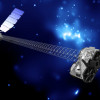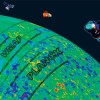Another stunning discovery hits the astronomic news: Seems there are big black holes in galaxies all over. This opens a new chapter in the quest to understand the role of black holes in our universe. But its significance may run even deeper: a step toward unraveling the mystery of dark matter. Last year I reviewed […]
Black Hole Bonanza

